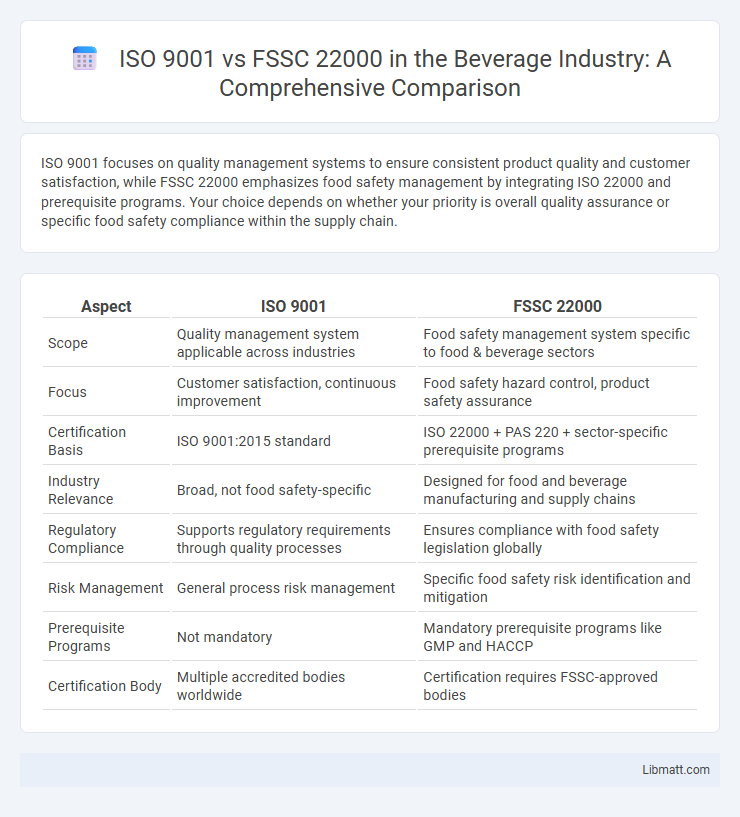ISO 9001 focuses on quality management systems to ensure consistent product quality and customer satisfaction, while FSSC 22000 emphasizes food safety management by integrating ISO 22000 and prerequisite programs. Your choice depends on whether your priority is overall quality assurance or specific food safety compliance within the supply chain.
Table of Comparison
| Aspect | ISO 9001 | FSSC 22000 |
|---|---|---|
| Scope | Quality management system applicable across industries | Food safety management system specific to food & beverage sectors |
| Focus | Customer satisfaction, continuous improvement | Food safety hazard control, product safety assurance |
| Certification Basis | ISO 9001:2015 standard | ISO 22000 + PAS 220 + sector-specific prerequisite programs |
| Industry Relevance | Broad, not food safety-specific | Designed for food and beverage manufacturing and supply chains |
| Regulatory Compliance | Supports regulatory requirements through quality processes | Ensures compliance with food safety legislation globally |
| Risk Management | General process risk management | Specific food safety risk identification and mitigation |
| Prerequisite Programs | Not mandatory | Mandatory prerequisite programs like GMP and HACCP |
| Certification Body | Multiple accredited bodies worldwide | Certification requires FSSC-approved bodies |
Introduction to ISO 9001 and FSSC 22000
ISO 9001 is an internationally recognized standard for quality management systems, emphasizing consistent product and service quality to enhance customer satisfaction. FSSC 22000 is a comprehensive food safety certification scheme that integrates ISO 22000, sector-specific prerequisite programs, and additional requirements to ensure food safety throughout the supply chain. Your organization can leverage ISO 9001 for overall quality management, while FSSC 22000 specifically targets food safety compliance in the food industry.
Understanding the Scope of Each Standard
ISO 9001 focuses on quality management systems applicable across various industries, emphasizing customer satisfaction and continual improvement. FSSC 22000 specifically targets food safety management, integrating ISO 22000 and additional sector-specific prerequisite programs to ensure comprehensive control of food safety hazards. Understanding the scope of each standard helps your organization align its quality or food safety objectives with the appropriate certification.
Key Similarities Between ISO 9001 and FSSC 22000
ISO 9001 and FSSC 22000 both emphasize systematic management approaches to improve organizational processes and ensure product quality and safety. Both standards require documented procedures, continual improvement, and risk management to enhance customer satisfaction and compliance with regulatory requirements. They integrate elements such as management commitment, internal audits, corrective actions, and employee training to foster consistent operational performance.
Major Differences: Focus Areas and Requirements
ISO 9001 centers on quality management systems, emphasizing customer satisfaction, process efficiency, and continual improvement across all organizational operations. FSSC 22000 targets food safety management, integrating ISO 22000 and sector-specific prerequisite programs to ensure hazard control within food production and supply chains. Your choice depends on whether quality consistency or comprehensive food safety compliance is the priority for your organization.
Applicability: Which Industries Use ISO 9001 vs FSSC 22000?
ISO 9001 applies broadly across industries seeking to implement effective quality management systems, including manufacturing, healthcare, and service sectors. FSSC 22000 targets food-related industries, such as food production, processing, packaging, and distribution, emphasizing food safety management. Your choice between these standards depends on whether quality management or food safety is the primary focus within your industry.
Certification Process: Steps for ISO 9001 and FSSC 22000
The certification process for ISO 9001 involves a comprehensive gap analysis, documentation review, and implementation of a quality management system aligned with ISO standards, followed by an internal audit and a final certification audit conducted by an accredited body. FSSC 22000 certification requires establishing a food safety management system based on ISO 22000, implementing prerequisite programs (PRPs), conducting hazard analysis critical control points (HACCP), and undergoing a rigorous audit process that includes both stage 1 and stage 2 audits, with continuous monitoring and verification. Your organization benefits from understanding these structured steps to ensure compliance, enhance operational efficiency, and meet industry-specific requirements effectively.
Documentation and Implementation Challenges
ISO 9001 requires comprehensive documentation of quality management systems emphasizing process consistency and customer satisfaction, while FSSC 22000 focuses on detailed food safety management documentation including HACCP plans and prerequisite programs. Implementation challenges for ISO 9001 often involve aligning diverse operational processes under a unified quality framework, whereas FSSC 22000 demands rigorous hazard analysis, critical control point identification, and strict compliance with food safety regulations. Both standards require ongoing monitoring and verification, but FSSC 22000's complexity in managing food safety risks poses a higher certification barrier compared to the more general quality emphasis of ISO 9001.
Benefits of ISO 9001 Certification
ISO 9001 certification enhances your organization's quality management system, leading to improved customer satisfaction, increased operational efficiency, and consistent product quality. It establishes a framework for continuous improvement, risk management, and regulatory compliance across various industries. Achieving ISO 9001 demonstrates a commitment to quality, boosting your brand reputation and competitive advantage in the global marketplace.
Advantages of FSSC 22000 Certification
FSSC 22000 certification offers significant advantages in food safety management by aligning with ISO 22000 standards and providing comprehensive sector-specific prerequisite programs (PRPs). This certification enhances your organization's credibility in the global food supply chain, ensuring compliance with globally recognized food safety regulations and reducing risks of contamination or recalls. Compared to ISO 9001, FSSC 22000 specifically targets food safety, offering greater assurance of product safety and quality to customers and stakeholders.
Choosing the Right Standard for Your Organization
Choosing between ISO 9001 and FSSC 22000 depends on your organization's primary focus: ISO 9001 emphasizes quality management systems applicable across various industries, while FSSC 22000 targets food safety management for organizations within the food supply chain. Organizations seeking comprehensive quality assurance should lean towards ISO 9001, whereas food manufacturers, processors, and related entities must prioritize FSSC 22000 to meet stringent food safety requirements and regulatory compliance. Evaluating your industry needs, risk management priorities, and stakeholder expectations will guide the selection of the most suitable certification standard.
ISO 9001 vs FSSC 22000 Infographic

 libmatt.com
libmatt.com